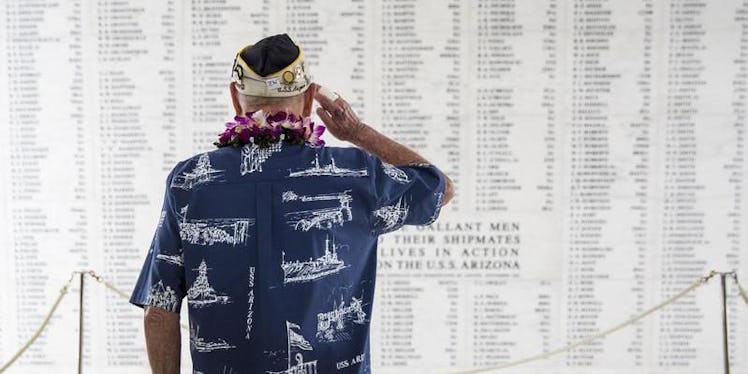
What Pearl Harbor Can Teach Us About Terrorism And Muslims Today
On December 7, 1941, Japan attacked the US naval base at Pearl Harbor. It was a devastating and shocking attack, claiming the lives of around 2,500 men and wounding 1,000 more.
This is ultimately what led the United States to enter World War II, a conflict that changed the world, and America's place and role in it, irrevocably.
When we look back on World War II, we often admire the bravery and courage of the American men and women who contributed to the Allies' ultimate victory. There is certainly nothing wrong with this, and their service and sacrifice should definitely be celebrated.
But one might argue we also don't pay enough attention to the more unflattering aspects of America's responses to Pearl Harbor.
It's important for us to be honest about the past in order to avoid making the same mistakes in the future.
The fact of the matter is the US did some abhorrent things to Japanese-Americans after Pearl Harbor. And we can learn a number of lessons from these choices in terms of how we react to terrorism and interact with Muslims in the present day.
In February 1942, just two months after Japan attacked the US, President Franklin D. Roosevelt signed Executive Order 9066, which called for all Japanese-Americans to relocate to the West Coast.
Around 120,000 people of Japanese descent were then forced to live in internment camps.
Some people died in the camps due to inadequate medical care, among other circumstances (including beatings from guards in some instances).
It was justified at the time as a "military necessity," in terms of protecting the nation from the ostensible threat Japanese-Americans posed to the war effort.
In other words, American citizens were profiled, detained and oppressed due to irrational fear. No person's civil liberties should be violated on the basis of their origins.
Half of the people in the camps were children. Among them was actor George Takei, famous for his role on Star Trek.
In July 2014, Takei spoke with Jon Stewart about his experience, stating,
I had just turned five years old, but I still remember that day. We were in the living room - my brother and I - looking out the window and we saw two American soldiers marching up the driveway. We were literally ordered out of our home at gunpoint.
Takei, like many others, remained in a camp until the end of the war.
What happened to the Japanese-Americans during this period was despicable. Particularly when you consider the fact one of the most decorated units of World War II, and in US military history, was the 442nd Regimental Combat Team (RCT).
The 442nd RCT was comprised almost entirely of Japanese-Americans, some of whom were volunteers from internment camps. It earned almost 18,000 awards for the bravery in just two years of the war, including 9,486 Purple Hearts, 4,000 Bronze Stars and 21 Medals of Honor.
These courageous individuals were proof Japanese-Americans were not seeking to sabotage the war effort during WWII. In fact, they were among the fiercest American fighters in the entire war.
With that said, we can learn a lot from how America mistreated Japanese-Americans in terms of current public sentiments toward Muslims and Syrian refugees.
Polling shows most Americans oppose helping Syrian refugees, and around 30 percent of Americans view Islam as an inherently violent faith.
Likewise, a YouGov poll from 2013 showed around 44 percent of Americans questioned the loyalty of Muslim-Americans to the US. This is reminiscent of people doubting the patriotism of Japanese-Americans during WWII.
There's evident fear of Muslims in this country at the moment, directly tied to the legacy of 9/11 as well as recent terror attacks in Paris and San Bernardino, California.
Many politicians aren't helping matters.
David Powers, the mayor of Roanoke, Virginia, recently contended the US should treat Syrian refugees like it did Japanese-Americans during World War II. He actually praised America's shameful use of internment camps during that period.
Republican presidential Donald Trump has said he'd expel all refugees from the US if elected president. He's also called for mosques to be shut down while arguing all Muslims should be registered in a database and carry special identification.
What's more, on the anniversary of Pearl Harbor, Trump called for the US to ban all Muslim immigrants from entering the country.
Donald Trump's latest press release calls for banning all Muslim immigration to the US. pic.twitter.com/KvJcGYGEQb — Elite Daily (@EliteDaily) December 7, 2015
Perhaps Trump, and any who feel the same, should realize there were over 15,000 Arab Americans who served in World War II, some of whom were Muslims. After the US was viciously attacked in Pearl Harbor, they fought bravely for the US in North Africa, Europe and Asia.
Many Muslims have bravely served the United States throughout its existence, including in Iraq and Afghanistan. There were even Muslim soldiers that served under the command of General George Washington during the American War for Independence.
Muslims and Syrian refugees aren't the enemy, and they're not synonymous with terrorism and ISIS.
I asked the White House about Trump's new proposal. Aide referred me to @POTUS comments from the Oval last night pic.twitter.com/PPo9A6Gd7f — E McMorris-Santoro (@EvanMcSan) December 7, 2015
We did terrible things to Japanese-Americans after Pearl Harbor, and many still bravely served the US during World War II and continued to enrich this country in the years that followed.
It would be a shame if the US didn't acknowledge and learn from the abhorrent crimes of its past. If people continue to condone discriminatory stances against Muslims, however, it's a sign we haven't progressed at all.